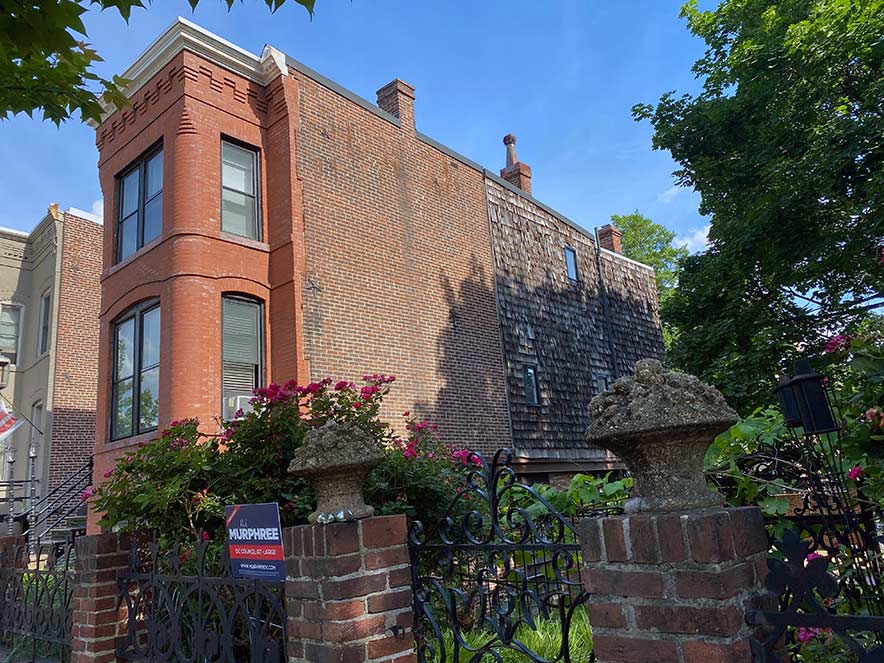
Nez signs off on D.C. home purchase
WINDOW ROCK
When the Capitol Hill home was built in 1830, the Indian Removal Act was signed. Almost 200 years later, Diné lawmakers decided that the home behind the U.S. House of Representatives will be the new location for the Navajo Nation Washington Office.
President Jonathan Nez on Sunday signed the resolution approving approximately $4.8 million from the Navajo Nation’s Land Acquisition Trust Fund principal to buy the land and two separate buildings. “With this it will show that Navajo has a voice,” said resolution sponsor Wilson Stewart during Navajo Nation Council’s Jan. 29 winter session.
“Navajo does have access to Washington,” he said. “Through the Senate, the Congress, when they look out they will see the Navajo Nation flag flying.”

Courtesy photo
The Navajo Nation Council passed legislation to purchase this $5.1 million building in Washington, D.C. for the Navajo Nation Washington Office.
The Navajo Nation Washington Office was created in 1984 and currently pays over $25,000 per month in rent, not including utilities, totaling $300,000 each year. These costs will never be recouped.
Regarding the effectiveness of NNWO, the office’s director, Santee Lewis, and Nez noted lobbying successes like the Navajo-Utah Water Rights Settlement Act, which was signed into law in December, the $53 million for internet service through the FCC’s E-Rate Program, the recent approval of at least $150 million for the Special Diabetes Program for Indians, hundreds of millions of dollars for uranium mine cleanup efforts, the COVID-19 vaccine doses and, of course, the $714 million from the Coronavirus Aid, Relief and Economic Security Act.
Four employees make up the NNWO and pictures of their flooded office space make it evident why purchasing the Capitol Hill property was a priority.
“Over a year ago Navajo Nation Washington Office embarked on this journey to find a home for the Navajo people in Washington, D.C.,” said Lewis during the Council meeting. “When the Navajo Nation Council first created NNWO in 1984, Navajo leaders envisioned someday planting the Navajo flag on Capitol Hill.”
She stated it will not only be used for offices, but also to offer accommodations for Navajo leadership. It could also serve as an incubator for Navajo students and teachers. It could enhance advocacy. Nez and Council delegates did not ignore public comments and criticism of the purchase.
In a recent and rare joint press release with Navajo Nation Council, Nez said the Land Acquisition Trust Fund has its own policies and guidelines that require the funds to be used only for these types of purchases of land and property.
The funds cannot be used for COVID-19 relief or direct services such as housing, as some critics had proposed. Some delegates had other questions, such as Health, Education and Human Services Vice Chair Carl Slater, who asked how the legislation works in accordance with the Land Acquisition Fund.
“How does this legislation conform with the purposes of the Land Acquisition Trust Fund?” asked Slater during Council. “The only item I can see is maybe this is an economic development move. “But if we are going to buy something that can’t be used, essentially, because we have to renovate it, or it will take a substantial amount of time, is that really an economic development decision?” he asked.
In response, Lewis said the building is ready for immediate occupancy. She also noted it can be used for economic development, because the carriage house, which is the second building, has been rented out to organizations for a fee of $5,000.
Also, the front lawn can be rented out to host a variety of events. Mike Halona, land department director, toured the building in November 2019 and assured Council the only change that could arise is if the owners changed their minds. But he doubted that would happen since the owner has been waiting for the Nation to decide.
“So far we have addressed and provided the information needed to continue to purchase this property and building in the zone that it’s in,” said Halona to Council. Regarding property tax, Lewis said the current owner paid $15,569 last year. Halona said upon approval they would discuss a tax exemption because the property will be owned by a sovereign nation.








 Highway 264,
Highway 264, I-40, WB @ Winslow
I-40, WB @ Winslow